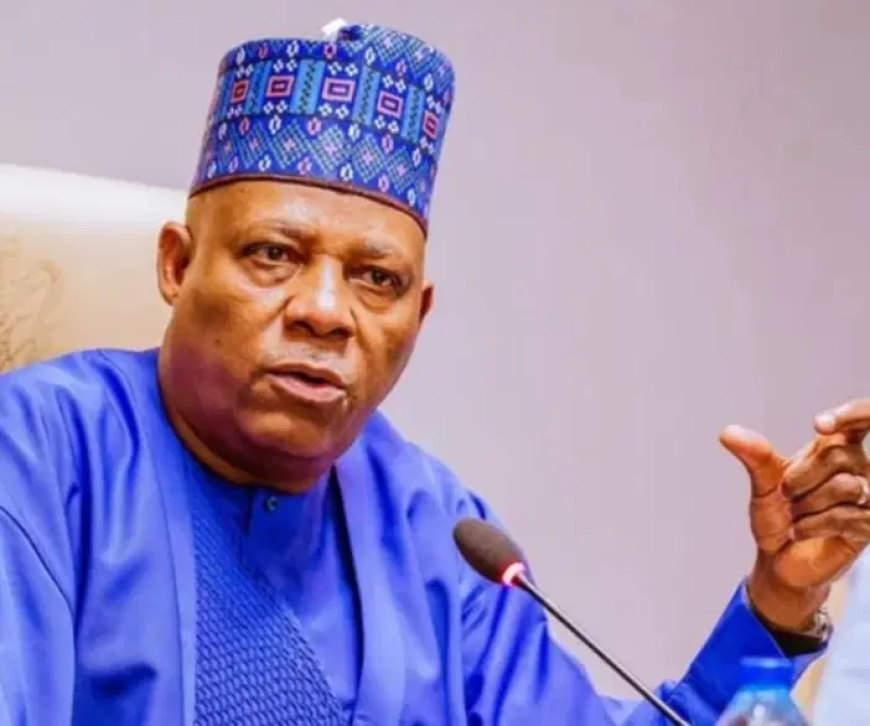GDP rebasing: Shettima worried over information gap between NBS, states

The Vice-President, Alhaji Kashim Shettima, has expressed worry over data and information gap between the National Bureau of Statistics (NBS), states and local government areas.
Shettima said this at the 2025 Workshop of the Chartered Institute of Stockbrokers (CIS) on Tuesday in Abuja.
Shettima was represented by Dr Tope Fasua, the Special Adviser to the President on Economic Matters.
The vice-president who was reacting to the 3.13 per cent Rebased Gross Domestic Product (GDP) Results released by the NBS on Monday, doubted that the rate reflected a true picture of growth in the economy.
Following the rebasing of Nigeria’s GDP report, the NBS stated that the country’s economy grew by 3.13 per cent in the first quarter of 2025 from the 2.27 per cent recorded in the same period in 2024.
Shettima noted that most of the state governors had been able to double their Internally Generated Revenue (IGR).
”If the state levels are an addition of what happens at the federal level, you wonder, if the states have increased their IGR between 100 and 300 per cent, how come the GDP is still where it is.
”And if the GDP is still growing at about three per cent, that means there is a lot more to discuss at that level.
”You will be shocked at the amount of information lacuna from institutions repository of our data from the state, local government levels,” he said.
Speaking on the capital market, he said capital formation was the engine of infrastructural development, growth and higher standard of living for citizens in the country.
Shettima said that in 2023, the country’s All-Share Index (ASI) stood at 55,000 points, while the market capitalisation was around N28 trillion.
The vice-president said that as at July 2025, the ASI had risen to 131,000 points and market capitalisation soared at N75 trillion.
He said the figure represented a threefold increase in market value within two years which was facilitated by renewed investors confidence had resulted to business expansion and significant boost to national wealth.
He said the figure had showed that the economy of the country was on a clear path of recovery and sustainable economic growth.
Corroborating the worries of Shettima, Gov. Caleb Mutfwang of Plateau, called for collaboration among various stakeholders.
Mutfwang who said the IGR of the state had grown tremendously.
He noted that the data released by the NBS about his state was not a true reflection of happenings in the state.
”We pursue the goal of the one trillion dollar economy by realistic evaluation of where we are. We must acknowledge that we must put our philosophy right.
”A lot of data we are generating is not from the bottom to the top, we harvest them from the top.
”We need to have the collaboration, we must ensure that every sub national also grows their economy.
We need capital, to de-risk the capital to enhance production, we also need creative ideas that will translate into the improved standard of living of people in the rural areas,” he said.
The Minister of State for Finance, Dr Doris Uzoka-Anite, said capital formation meant that Small and Medium Enterprises would have access for affordable finding for their businesses.
Uzoka-Anite said for the country to achieve a one- trillion dollar economy, there was a need to build strong and resilient institution.
She said the government was working toward removing bottlenecks that prevented companies from listing on the Nigerian Exchange Ltd.
According to her, we must align long-term capital with long term development goals
The Chairman of the Ministry of Finance, Incorporated, Dr Shamsudeen Usman, said achieving a one trillion dollar economy required collaborative actions of the federal, state governments and the private sector.
Usman who was a former Minister of Finance attributed lack of continuity of policies and personnel as some factors that could prevent the achievement of the target.
Mr Shamseldeen Ogunjimi, the Accountant-General of the Federation, said strong institutions were the backbone to every striving economy.
Ogunjimi said one trillion dollars economy was achievable by deepening the capital market.
He said priotising investment in agriculture and technology would help the country to achieve the target.
The accountant-general called on the CIS to uphold ethical practices and advocate policies that would encourage market liquidity.
Dr Emomotimi Agama, the Director-General of the Securities and Exchange Commission (SEC), said the capital market was about capital formation.
Agama said the Investment and Securities Act (ISA 2025) was an invitation for stockbrokers to innovate beyond traditional products, investors to deploy capital with confidence and regulators to supervise with foresight.
He said the mission of the commission was to operationalise the Act with speed and precision.
”Every rule drafted, every policy enacted, must be measured against one metric-does this get us closer to $1 trillion,” he said.
Agama said the responsibility of SEC and all stakeholders in the sector was to build a market that would build the economy of the country.
The President of CIS, Mr Oluropo Dada, said that accelerating capital formation in all sectors of the economy would guarantee long term economic stability.
Dada said capital formation was a national necessity, saying that a vibrant industrial sector was the lifeblood of capital formation.
He said the theme of the workshop was apt as there was the need to invest in the real capital to help improve standard of living of citizens and ensure economic development.
A former President of CIS, Mr Olutola Mobolurin, said that developing risk capital formation would accelerate the journey of the country to a one trillion dollar economy.
The News Agency of Nigeria (NAN) reports that the theme of the workshop is: “Capital Formation in Nigeria: Strengthening Industry, Institutions and Markets to bolster a $1 trillion Economy.”
NAN reports that the workshop attracted financial and capital market stakeholders from around the country.

 admin
admin 


